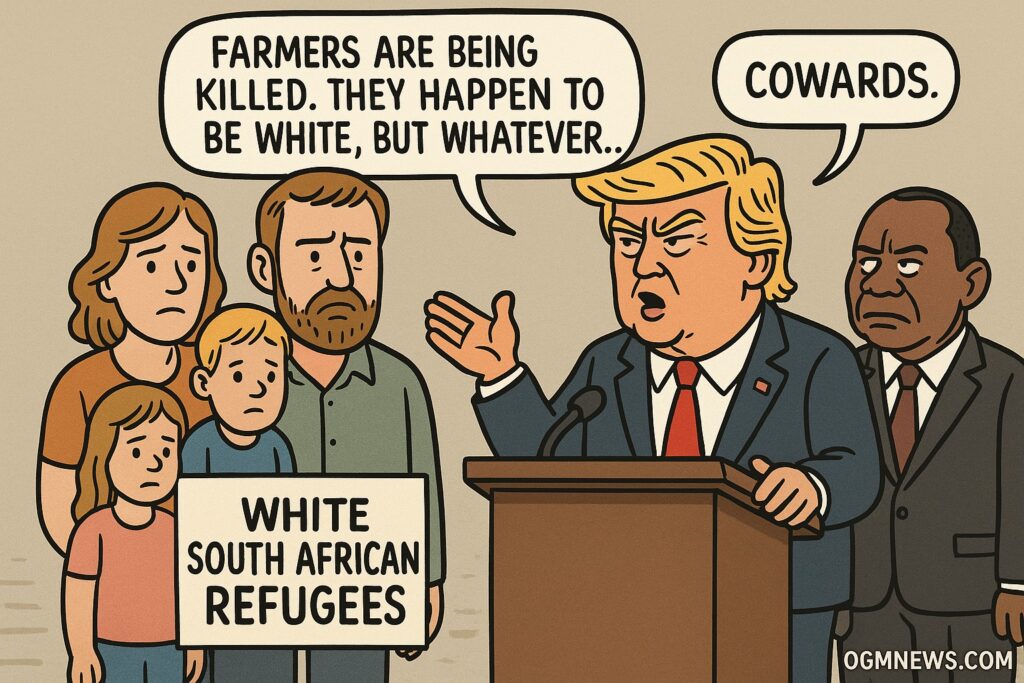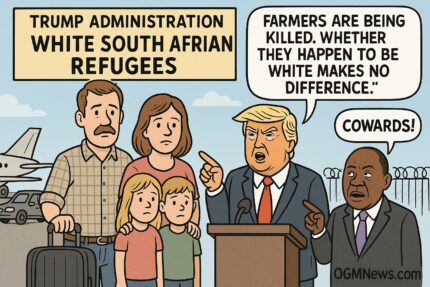On May 11, 2025, a group of 59 white South Africans—primarily Afrikaner farmers—were admitted into the United States under refugee status, despite the Trump administration’s continued suspension of most refugee admissions. The decision has reignited global tensions over race, asylum, land reform, and international law. Critics say the move exposes racial bias within U.S. refugee policy, while defenders argue the farmers are fleeing legitimate persecution.
The controversy has touched every level of politics—from the White House to South African Parliament—and raised critical questions: Are these 59 White South Africans truly refugees, or are they political instruments in a racially charged global narrative?
Who Are the 59 White South Africans Refugees? Claims of Persecution
The group largely comprises Afrikaner families from rural farming communities, with many citing fear of violent attacks and government hostility toward white landowners. Applicants told U.S. officials they faced threats from land invaders, violent break-ins, and a climate of fear stoked by recent political rhetoric around land expropriation.
Resettlement and Fast-Tracked Admission
Despite a near-total freeze on refugee entries from regions plagued by war, the 59 White South Africans were expedited through a special program. After landing at Dulles International Airport via a U.S. State Department charter, the group was dispersed across states including Idaho, Alabama, Nevada, and Minnesota. Critics questioned why this group received preferential treatment while others—fleeing from active warzones like Syria and Sudan—were denied entry.
Inconsistencies in Policy Enforcement
Interviews reportedly focused on land disputes and crime rates rather than conventional criteria for political asylum. Immigration experts and civil rights groups argue this represents a troubling departure from precedent, suggesting a possible racial or political motive behind the administration’s decision.
The “White Genocide” Lies: Rhetoric vs. Reality of Genocide Claim
President Donald Trump justified the admission by referencing what he called an ongoing “genocide” against white South African farmers. He claimed the farmers were being “hunted and killed,” attributing the violence to racial animus and government-sanctioned land seizures.
Legal and Scholarly Dismissals
However, a South African court earlier this year firmly rejected such assertions, labeling them “clearly imagined” during a high-profile estate dispute. While farm attacks do occur, the court concluded they do not meet the legal criteria for genocide. Scholars and human rights observers further note that violent crime in South Africa is widespread and affects citizens of all races.
Farm Murders in Context
Though there are real instances of violence against farmers—around 60 to 70 farm-related murders annually—data shows these attacks are not racially exclusive. Many victims are black farmworkers or owners, and motivations often stem from robbery rather than racial hatred.
South Africa’s Government and the Refugee Definition

Ramaphosa’s Rebuke
South African President Cyril Ramaphosa criticized the refugees, branding them “cowards” for fleeing rather than contributing to national development. He emphasized that white South Africans remain the most economically advantaged group in the country, with wealth and landownership levels vastly disproportionate to their minority status.
Refugee Criteria Under International Law
According to the South African government, genuine refugees must face state-backed persecution based on political, religious, or ethnic grounds. Officials argue that while farm attacks are tragic, they stem from general criminality and not targeted ethnic cleansing. As such, the fleeing farmers do not meet internationally recognized criteria for refugee status.
59 White South Africans Resent Reforms of Land Ownership,
In 2024, South Africa’s Parliament passed a controversial amendment allowing the government to expropriate land without compensation. The goal: to rectify centuries of apartheid-era dispossession and redistribute land to the black majority.
Disparities Highlighted by Land Audits
A 2017 government audit found that white South Africans—about 7% of the population—own roughly 72% of privately held farmland. In contrast, black South Africans, who make up over 90% of the population, own just 4%. These staggering imbalances fuel both domestic frustration and international scrutiny.
Government Defense of Expropriation
Officials argue that redistributive land policy is not racial persecution but a long-overdue correction of historic injustice. They insist the measures are constitutional, aiming to address the nation’s economic inequality and promote long-term social stability.
Crime and Farm Attacks: Real Threats, Misleading Narratives
Civil society organizations report consistent levels of violence against farmers, with rural isolation and weak law enforcement infrastructure being key risk factors. However, comprehensive crime data from the South African Police Service shows that victims include people of all races and that farm attacks are only a small percentage of national violent crime rates.
Weaponized Fear
Activists and legal experts warn that isolated incidents are being leveraged to fuel political agendas—particularly by right-wing groups in the U.S. and South Africa who portray white farmers as victims of a reverse-apartheid regime. This, they argue, distorts reality and undermines trust in democratic institutions.
Backlash at Home and Abroad
The Episcopal Church, which had partnered with the U.S. government for four decades on refugee resettlement, severed ties in protest. Church leaders condemned what they called a racially motivated betrayal of the universal refugee ideal. “We cannot support a system that prioritizes white South Africans over war-displaced Syrians,” said Bishop Michael Arnett in a strongly worded statement.
NGOs and Human Rights Groups React
International humanitarian organizations also voiced alarm, warning that the Trump administration’s selective compassion erodes the credibility of America’s global leadership on refugee protection. The United Nations High Commissioner for Refugees (UNHCR) has not commented publicly but is reportedly conducting a review of the U.S. admissions process for potential violations of the 1951 Refugee Convention.
A Refugee Designation That Raises More Questions Than It Answers
The admittance of 59 white South Africans into the U.S. as refugees has unearthed deep tensions around race, privilege, and international asylum law. While their personal fears may be real, the legal and ethical basis for their refugee status remains highly contested.
This exception, granted amid a near-total halt in refugee resettlement for others—including people fleeing civil wars and political persecution—has sparked a national reckoning. It challenges America’s values on fairness and equality, and forces an uncomfortable conversation about how race and geopolitics shape who gets to flee—and who gets to belong.














